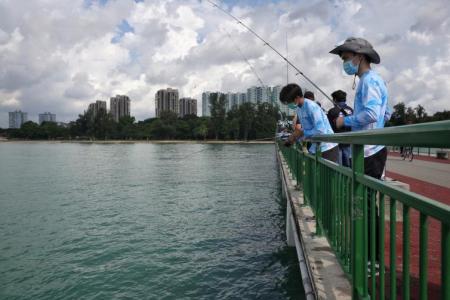Fishing community cultivates good habits to protect environment
Even before casting the first line, 16-year-old recreational fisherman Benjamin Brighton would patrol the jetty, pick up litter and discarded fish, and keep an eye out for lines and hooks left behind.
The United World College student has been doing this since he joined LightSaltGame, a fishing group, a year ago. It was started by fishing enthusiasts, one of whom owns a store of the same name.
The recreational fishing community has also made it compulsory for participants in its annual tournament to clean up the area before fishing - to ensure that popular fishing spots are safe for humans.
Said Benjamin, who has been fishing for 10 years: "About five months back, my brother agreed to go fishing with me at Bedok Jetty. In just 30 minutes, he got a big hook stuck in his leg; he was walking around in sandals."
The 13-year-old had to go to hospital to get the hook removed as it still had bait on it, which could have caused a major infection.
A recent spate of cases has also shown how irresponsibly discarded fishing gear can hurt marine creatures. In May, a critically endangered hawksbill turtle was found, head severed from its body, off Pulau Hantu. It had been tightly bound in a discarded fishing net.
Stepping up efforts to reduce the impact of recreational fishing on marine life, conservation non-profit organisation Marine Stewards last year introduced sustainable fishing guidelines. It also started a three-hour workshop, FishX, supported by volunteers from the local fishing community.
A spokesman said: "(By normalising practices), we hope Singapore will have a thriving marine ecosystem that all will be able to experience."
Another group, SGFishingRigz - a fishing store started by six students and which has a fishing influencer TikTok account of the same name - has a programme to buy used rigs and sinkers from fishermen so that these toxic lead objects are not disposed of incorrectly.
The store has also been working with Temasek Polytechnic to create sinkers made of bismuth, a substitute heavy metal less toxic than lead. They are being trialled under the FishX programme.
Recognising the importance of collaboration among groups, an SGFishingRigz spokesman said: "We hope to work closely with (various fishing agencies) and more anglers in protecting our waters and making fishing an enjoyable sport."
• You can find out more about Marine Stewards at marinestewards.org. You can also support SGFishingRigz and Light SaltGame by purchasing items from their shops, at sgfishingrigz.com and lightsaltgame.com respectively.
Get The New Paper on your phone with the free TNP app. Download from the Apple App Store or Google Play Store now



